Taltos lotmw-3 Read online
Page 50
The flames leapt up, obscuring her fair face, and a low roar came from the rapidly burning timbers. And then came her voice again, louder, full of agony and full of courage.
“A curse on Donnelaith, a curse on its people forever! A curse on the Clan of Donnelaith. A curse on Ashlar’s people.”
Something writhed within the flames. I did not know if it was Janet in her final pain, or some trick of light and shadow and flickering.
I had fallen to my knees. I couldn’t stop the tears and I couldn’t look away. It was as if I had to go as far as I could with her into her pain, and I prayed to Christ, “She knows not what she says, take her to heaven. For her kindnesses to others, for her goodness to her people, take her to heaven.”
The flames leapt heavenward, and then at once began to die away, revealing the stake, the smoldering heap of wood and burnt flesh and bone that had been this gracious creature, older and wiser than I was.
The glen was still. Nothing remained of my people now but five males who vowed to be celibate Christians.
Lives that had existed for centuries had been snuffed out. Torn limbs, severed heads, and mutilated bodies lay everywhere.
The human Christians wept. We wept. A curse on Donnelaith, she had said. A curse. But, Janet, my darling Janet, I prayed, what more can happen to us! I collapsed on the ground.
At that moment I wanted no more of life. I wanted no more of suffering or death, or of the best of intentions resulting in abominable ruin.
But the monks came to me, lifting me to my feet. My followers called to me. I was to come, they said, to behold a miracle that had happened before the ruined and burnt-out tower that had once been the home of Janet and those closest to her.
Dragged there, dazed, unable to speak, I was gradually made to understand that an old spring, long dried, had come to life, clear water bubbling up from the earth once again, and cutting its path through the old dried bed, between hillocks and the roots of the trees and into a great drift of wildflowers.
A miracle!
A miracle. I pondered. Should I point out that that stream had come and gone a number of times in the century? That the flowers were blooming yesterday and the day before because the earth there was already damp, presaging the little fount which had now at last broken through the surface again?
Or should I say:
“A miracle.”
I said, “A sign from God.”
“Kneel, all,” cried Ninian. “Bathe in this holy water. Bathe away the blood of those who wouldn’t accept God’s grace and have gone now to eternal perdition.”
Janet burning in hell forever, the pyre that will never go out, the voice that will curse me still crying …
I shuddered and all but fainted again, but I fell on my knees.
In my soul, I knew that this new faith must sweep me up, it must consume my whole life, or I was lost forever!
I had no more hope, no more dreams; I had no more words, and no more thirst for anything! This had to save me, or I should die in this very spot now, by sheer will, never speaking or moving or taking nourishment again until death stole over me.
I felt the cold water slapped against my face. I felt it running down into my robes. The others had gathered. They too were bathing. The monks had begun to sing the ethereal psalms which I had heard on Iona. My people, the humans of Donnelaith crying and sad, and eager for the same grand redemption, took up the song, in the old-fashioned way, singing the lines right after the monks, until voices everywhere were raised in praise of God.
We were all baptized in the Name of the Father, and of the Son, and of the Holy Ghost.
The Clan of Donnelaith was Christian thereafter. All human save for five Taltos.
Before the following morning a few more Taltos were discovered, mostly very young women who had been shielding two almost newborn males in their house, from which they had seen the whole tragedy, including Janet’s execution. They were six altogether.
The Christian humans brought them to me. They would not speak, either to accept or deny Christ, but looked at me in terror. What should we do?
“Let them go, if they will,” I said. “Let them flee the valley.”
No one had the stomach for any more blood or death. And their youth and their simplicity and their innocence made a shield around them. As soon as the new converts stepped back, these Taltos fled, with nothing but the clothes on their backs, right into the forest.
In the days that followed, we five males who were left did win the entire goodwill of the people. In the fervor of their new religion, they praised us that we had brought Christ to them, and honored us for our vows of celibacy. The monks prepared us with instructions day and night to accept Holy Orders. We pored over our holy books. We prayed constantly.
Work was begun upon the church, a mighty Roman-style building of dry stone, with rounded arch windows and a long nave.
And I myself led a procession through the old circle, at which we effaced any symbols from olden times, and carved into the rocks new emblems, from the Altar Book of the Gospels.
These were the fish, which stood for Christ, the dove, which stood for the Apostle John, the lion for Mark, the ox for Luke, and the man for Matthew. And in a little Taltos fury we carved other biblical scenes into the flatter stones, and moved into the cemetery, putting crosses upon the old graves, in the style of the crosses of the book, very ornate and ornamented.
It was a brief interlude in which something returned of the old fervor that had once taken hold of all of us on the Salisbury Plain. But we were only five now, and not an entire tribe, five who had renounced their own nature to please God and the human Christians, five who had been cast in the role of saints in order not to be massacred.
But a dark terror lurked inside me and in the others. How long would this uneasy truce last? Would not the slightest sin topple us from our pedestals?
Even as I prayed to God to help me, to forgive me for all my errors, to bind me to him as a good priest, I knew that we five could not remain in Donnelaith much longer.
And I could not endure it myself! Even at my prayers, and during the singing of psalms with the monks, I heard Janet’s curse in my ears, I saw my people covered in blood. Christ, give me faith, I prayed, yet in my secret heart I did not believe that the only path for my kind was one of such renunciation and chastity. How could it be? Did God mean for us to die out?
This was not self-sacrifice, it was a form of utter denial. For Christ, we had become no one!
Yet the love of Christ burned hot in me. It burned desperately. And a very strong personal sense of my Savior developed in me as it has in Christians always. Night after night in my meditations I envisioned the Chalice of Christ, the holy hill on which Joseph’s hawthorn bloomed, the blood in the water of Chalice Well. I made a vow to go in pilgrimage to Glastonbury.
There were rumblings from outside the glen. Men had heard of the Holy Battle of Donnelaith, as it had come to be called. They had heard of the tall celibate priests with strange powers. Monks had written to other monks, passing on the story.
The legends of the Taltos came alive. Others who had lived as Picts in small communities had now to flee their homes as their pagan neighbors taunted and threatened them, and as Christians came to plead with them to renounce their wicked ways and become “holy fathers.”
Wild Taltos were found in the forest; there were rumors of the magic birth having been witnessed in this or that town. And the witches were on the prowl, boasting that they could make us reveal ourselves, and render us powerless.
Other Taltos, richly dressed and armed to the teeth, and now exposed for what they were, came in heavily defended groups to the glen and cursed me for what I had done.
Their women, beautifully clothed, and guarded on all sides, spoke of Janet’s curse, having heard whispers of this, no doubt from the Taltos who had fled Donnelaith, and demanded that I repeat the curse to all, and hear their judgments.
I refused. I said nothing.
“Cursed, Ashlar, cursed for all time. May death elude you forever. May you wander-loveless, childless-your people gone, until our miraculous birth is your only dream in your isolation…. May the world around you crumble before your suffering is ended.”
It had become a poem to them which they could recite, and they spat at my feet when they were finished.
“Ashlar, how could you forget the lost land?” the women demanded. “How could you forget the circle of Salisbury Plain?”
These brave few walked amid the ruins of the old brochs; the human Christians of Donnelaith looked on them with cold eyes and fear, and sighed with relief when they took their final leave of the valley.
Over the months that followed, some Taltos came who had accepted Christ and wanted to become priests. We welcomed them.
All over northern Britain, the quiet time for my people had ended.
The race of the Picts was fast disappearing. Those who knew the Ogham script wrote terrible curses on me, or they carved into walls and stones their newfound Christian beliefs with fervor.
An exposed Taltos might save himself by becoming a priest or a monk, a transformation which not only appeased the populace but greatly exhilarated it. Villages wanted a Taltos priest; Christians of other tribes begged for a celibate Taltos to come and say the special Mass for them. But any Taltos who did not play this game, who did not renounce his pagan ways, who did not claim the protection of God, was fair game for anyone.
Meantime, in a great ceremony, some five of us, and four who had come later, accepted Holy Orders. Two female Taltos who had come into the glen became nuns in our community, and dedicated themselves to caring for the weak and the sick. I was made Father Abbot of the monks of Donnelaith, with authority over the glen and even the surrounding communities.
Our fame grew.
There were times when we had to barricade ourselves in our new monastery to escape the pilgrims who came “to see what a Taltos was” and to lay hands on us. Word got around that we could “cure” and “work miracles.”
Day after day, I was urged by my flock to go to the sacred spring, and bless the pilgrims there who had come to drink the holy water.
Janet’s broch had been torn down. The stones from her home, and what metal could be melted down from her plate and few bracelets and rings, were put into the building of the new church. And a cross was erected at the holy stream, inscribed with Latin words to celebrate the burning of Janet and the subsequent miracle.
I could barely look at this. Is this charity? Is this love? But it was more than plain that for the enemies of Christ, justice could be as bitter as God chose to make it.
But was all this God’s plan?
My people destroyed, our remnants turned into sacred animals? I pleaded with our monks from Iona to discourage all those beliefs! “We are not a magical priesthood!” I declared. “These people are on the verge of declaring that we have magical powers!”
But to my utter horror the monks said that it was God’s will.
“Don’t you see, Ashlar?” said Ninian. “This is why God preserved your people, for this special priesthood.”
But all that I had envisioned had been laid waste. The Taltos had not been redeemed, they had not discovered a way to live on the earth at peace with men.
The church began to grow in fame, the Christian community became enormous. And I feared the whims of those who worshiped us.
At last I set aside each day an hour or two when my door was locked and no one might speak to me. And in the privacy of my cell, I began a great illustrated book, using all the skill I had acquired from my teacher on Iona.
Done in the style of the Four Gospels, it was to be, complete with golden letters on every page, and tiny pictures to illustrate it, the story of my people.
My book.
It was the book which Stuart Gordon found in the crypts of the Talamasca.
For Father Columba, I wrote every word, lavishing on it my greatest gift for verse, for song, for prayer, as I described the lost land, our wanderings to the southern plain, the building of our great Stonehenge. In Latin, I told all I knew of our struggles in the world of men, of how we’d suffered and learned to survive, and how at last my tribe and clan had come to this-five priests amid a sea of humans, worshiped for powers we did not possess, exiles without a name, a nation, or a god of our own, struggling to beg salvation from the god of a people who feared us.
“Read my words here, Father,” I wrote, “you who would not listen to them when I tried to speak them. See them here inscribed in the language of Jerome, of Augustine, of Pope Gregory. And know that I tell the truth and long to enter God’s church as what I truly am. For how else will I ever enter the Kingdom of Heaven?”
Finally my task was complete.
I sat back, staring at the cover to which I myself had affixed the jewels, at the binding which I myself had fashioned from silk, at letters which I myself had written.
At once I sent for Father Ninian, and laid the book before him. I sat very still as Ninian examined the work.
I was too proud of what I’d done, too certain now that somehow our history would find some redeeming context in the vast libraries of church doctrine and history. “Whatever else happens,” I thought, “I have told the truth. I have told how it was, and what Janet chose to die for.”
Nothing could have prepared me for the expression on Ninian’s face when he closed the volume.
For a long moment he said nothing, and then he began to laugh and laugh.
“Ashlar,” he said, “have you lost your mind, that you would expect me to take this to Father Columba!”
I was stunned. In a small voice I said, “I’ve given it all my effort.”
“Ashlar,” he said, “this is the finest book of its kind I’ve ever beheld; the illustrations are perfectly executed, the text written in flawless Latin, replete with a hundred touching phrases. It is inconceivable that a man could have created this thing in less than three to four years, in the solitude of the scriptorium at Iona, and to think that you have done it here within the space of a year is nothing short of miraculous.”
“Yes?”
“But the contents, Ashlar! This is blasphemy. In the Latin of Scripture, and in the style of an Altar Book, you have written mad pagan verses and tales full of lust and monstrousness! Ashlar, this is the proper form for Gospels of the Lord, and psalters! Whatever possessed you to write your frivolous stories of magic in this manner?”
“So that Father Columba would see these words and realize they were true!” I declared.
But I had already seen his point. My defense meant nothing.
Then, seeing me so crushed, he sat back and folded his hands and looked at me.
“From the first day I came into your house,” he said, “I knew your simplicity and your goodness. Only you could have made such a foolish blunder. Put it aside; put your entire history aside once and for all! Devote your extraordinary talent to the proper subjects.”
For a day and a night I thought on it.
Wrapping my book carefully, I gave it again to Ninian.
“I am your abbot here at Donnelaith,” I said, “by solemn appointment. Well, this is the last order I shall ever give you. Take this book to Father Columba as I’ve told you. And tell him for me that I have chosen to go away on a pilgrimage. I don’t know how long I will be gone, or where. As you can see from this book, my life has already spanned many lifetimes. I may never lay eyes on him again, or on you, but I must go. I must see the world. And whether I shall ever return to this place or to Our Lord, only He knows.”
Ninian tried to protest. But I was adamant. He knew that he had to make a journey home to Iona soon anyway, and so he gave in to me, warning me that I did not have Columba’s permission to go away, but realizing that I did not care about this.
At last he set out with the book, and a strong
guard of some five human beings.
I never saw that book again until Stuart Gordon laid it out on the table in his tower at Somerset.
Whether it ever reached Iona I don’t know.
My suspicion is that it did, and it may have remained at Iona for many years, until all those who knew what it was, or knew who’d written it or why it was there, were long gone.
I was never to know whether Father Columba read it or not. The very night after Ninian went on his way, I resolved to leave Donnelaith forever.
I called the Taltos priests together into the church and bade them lock the doors. The humans could think what they liked, and indeed this did make them naturally restless and suspicious.
I told my priests that I was leaving.
I told them that I was afraid.
“I do not know if I have done right. I believe, but I do not know,” I said. “And I fear the human beings around us. I fear that any moment they might turn on us. Should a storm come, should a plague sweep through the land, should a terrible illness strike the children of the more powerful families-any of these disasters could provoke a rebellion against us.
“These are not our people! And I have been a fool to believe that we could ever live in peace with them.
“Each of you, do what you will, but my advice to you as Ashlar, your leader since the time we left the lost land, is go away from here. Seek absolution at some distant monastery, where your nature is not known, and ask permission to practice your vows in peace there. But leave this valley.
“I myself shall go on a pilgrimage. First to Glastonbury, to the well there where Joseph of Arimathea poured the blood of Christ into the water. I will pray there for guidance. Then I will go to Rome, and then perhaps, I do not know, to Constantinople to see the holy icons there which are said to contain the very face of our Christ by magic. And then to Jerusalem to see the mountain where Christ died for us. I herewith renounce my vow of obedience to Father Columba.”
There was a great outcry, and much weeping, but I stood firm. It was a very characteristic Taltos way of ending things.

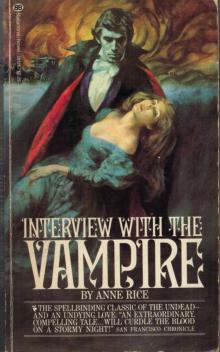 Interview with the Vampire
Interview with the Vampire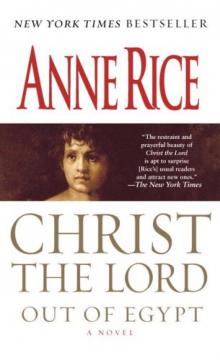 Christ the Lord: Out of Egypt
Christ the Lord: Out of Egypt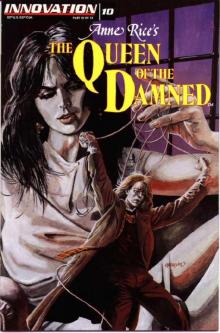 The Queen Of The Damned
The Queen Of The Damned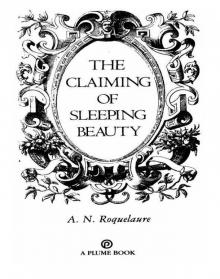 The Claiming of Sleeping Beauty
The Claiming of Sleeping Beauty Prince Lestat
Prince Lestat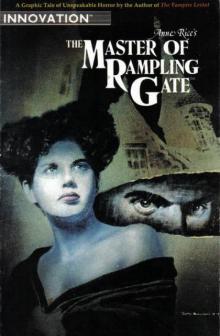 The Master of Rampling Gate
The Master of Rampling Gate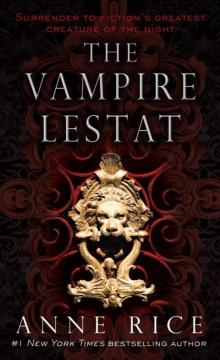 The Vampire Lestat
The Vampire Lestat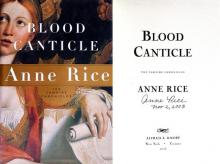 Blood Canticle
Blood Canticle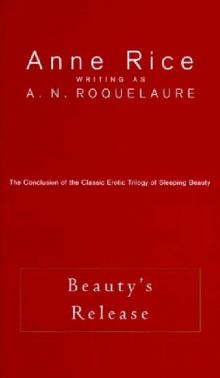 Beauty's Release
Beauty's Release Pandora
Pandora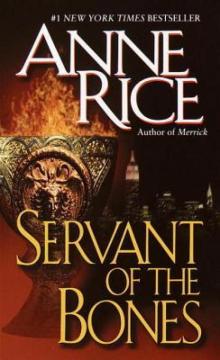 Servant of the Bones
Servant of the Bones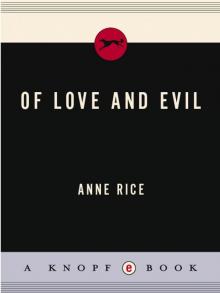 Of Love and Evil
Of Love and Evil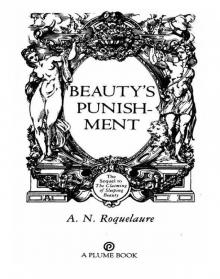 Beauty's Punishment
Beauty's Punishment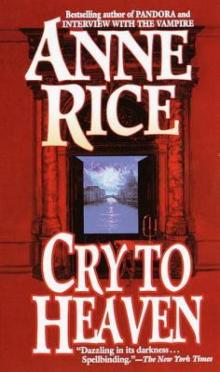 Cry to Heaven
Cry to Heaven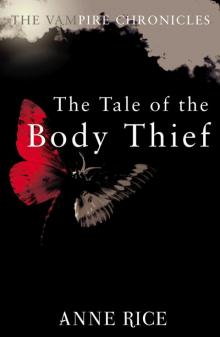 The Tale of the Body Thief
The Tale of the Body Thief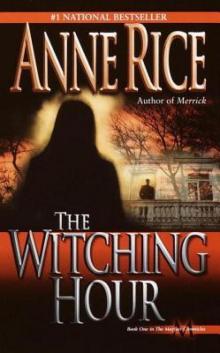 The Witching Hour
The Witching Hour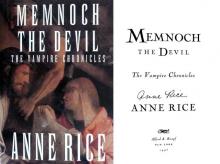 Memnoch the Devil
Memnoch the Devil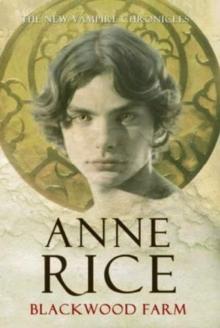 Blackwood Farm
Blackwood Farm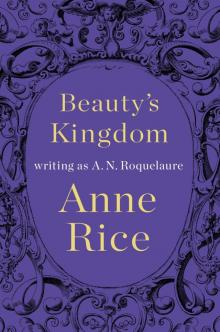 Beauty's Kingdom
Beauty's Kingdom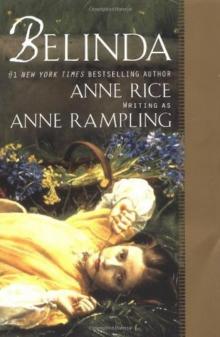 Belinda
Belinda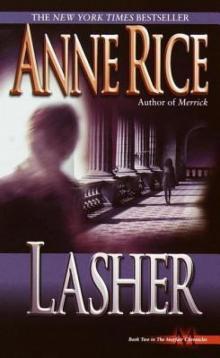 Lasher
Lasher Vittorio, the Vampire
Vittorio, the Vampire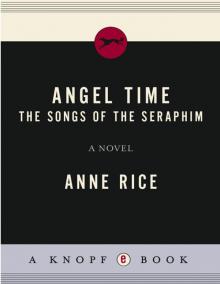 Angel Time
Angel Time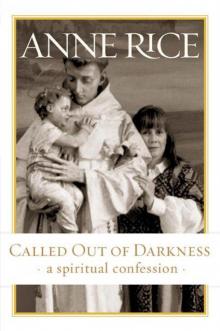 Called Out of Darkness: A Spiritual Confession
Called Out of Darkness: A Spiritual Confession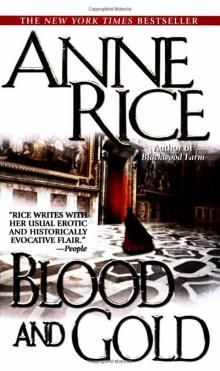 Blood And Gold
Blood And Gold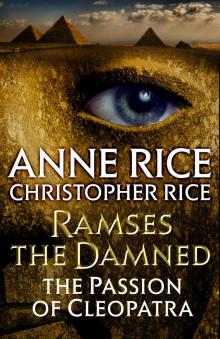 The Passion of Cleopatra
The Passion of Cleopatra Taltos
Taltos Exit to Eden
Exit to Eden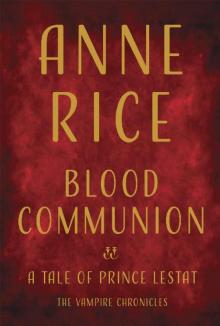 Blood Communion (The Vampire Chronicles #13)
Blood Communion (The Vampire Chronicles #13) The Wolf Gift
The Wolf Gift The Wolves of Midwinter
The Wolves of Midwinter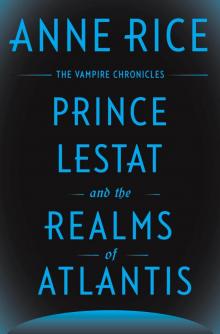 Prince Lestat and the Realms of Atlantis
Prince Lestat and the Realms of Atlantis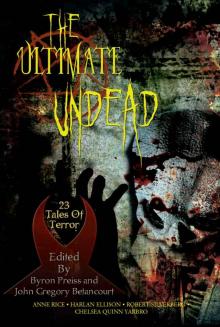 The Ultimate Undead
The Ultimate Undead The Vampire Lestat tvc-2
The Vampire Lestat tvc-2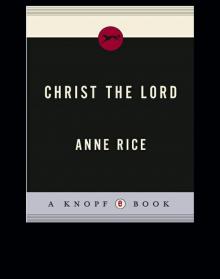 The Road to Cana
The Road to Cana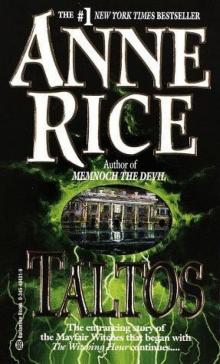 Taltos lotmw-3
Taltos lotmw-3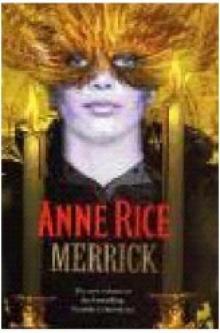 Merrick tvc-7
Merrick tvc-7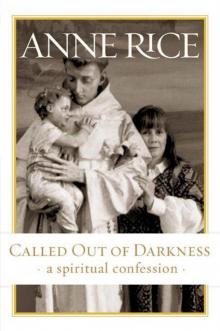 Called Out of Darkness
Called Out of Darkness Pandora - New Vampires 01
Pandora - New Vampires 01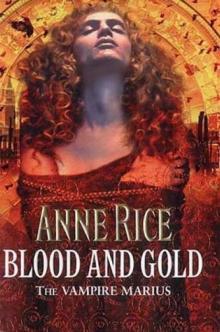 Bllod and Gold
Bllod and Gold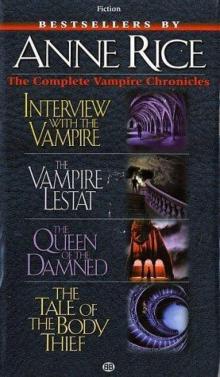 The Queen Of the Damned: Vampire Chronicles
The Queen Of the Damned: Vampire Chronicles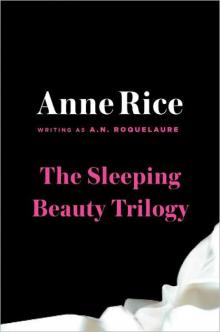 The Sleeping Beauty Trilogy
The Sleeping Beauty Trilogy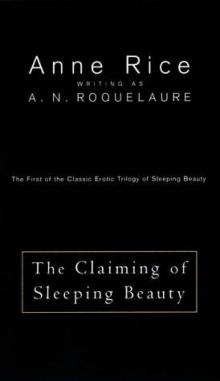 The Claiming of Sleeping Beauty b-1
The Claiming of Sleeping Beauty b-1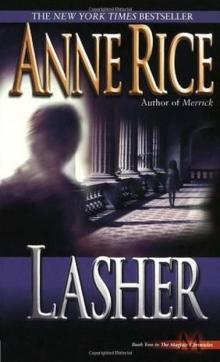 Lasher lotmw-2
Lasher lotmw-2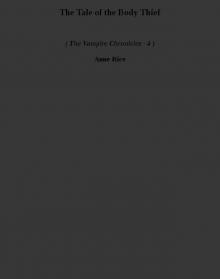 The Tale of the Body Thief tvc-4
The Tale of the Body Thief tvc-4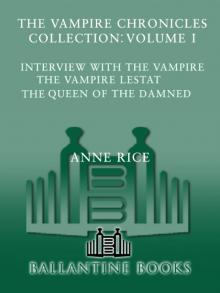 The Vampire Chronicles Collection
The Vampire Chronicles Collection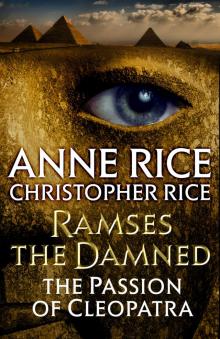 Ramses the Damned
Ramses the Damned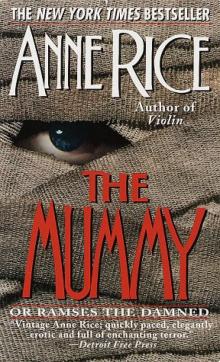 The Mummy - or Ramses the Damned
The Mummy - or Ramses the Damned Vittorio, The Vampire - New Vampires 02
Vittorio, The Vampire - New Vampires 02 The Vampire Armand tvc-6
The Vampire Armand tvc-6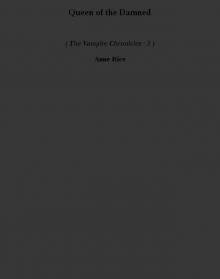 Queen of the Damned tvc-3
Queen of the Damned tvc-3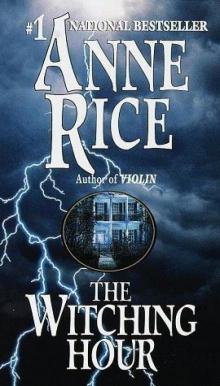 The witching hour lotmw-1
The witching hour lotmw-1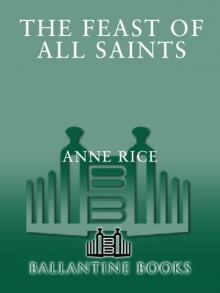 Feast of All Saints
Feast of All Saints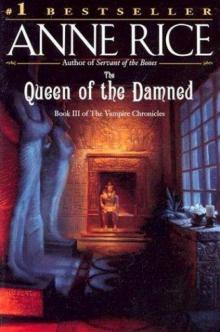 Queen of the Damned
Queen of the Damned The Wolves of Midwinter twgc-2
The Wolves of Midwinter twgc-2 The Mummy
The Mummy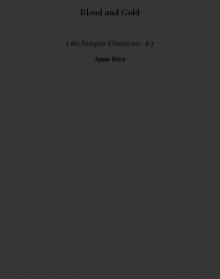 Blood and Gold tvc-8
Blood and Gold tvc-8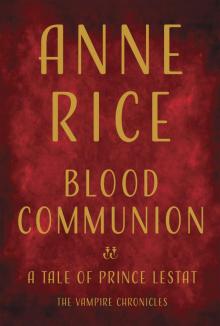 Blood Communion
Blood Communion Interview with the Vampire tvc-1
Interview with the Vampire tvc-1 Prince Lestat: The Vampire Chronicles
Prince Lestat: The Vampire Chronicles